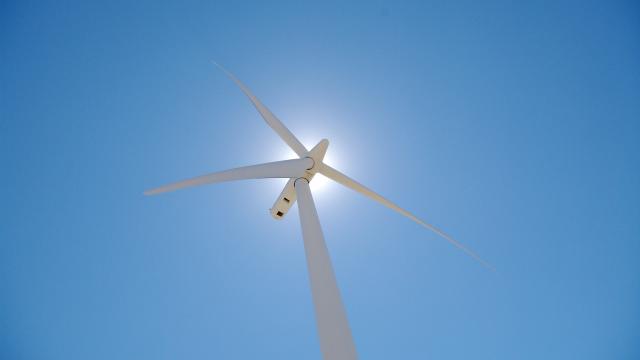For the second time in recent months and the third time over the past year, President Obama has penned a policy commentary in a leading scientific journal. This time, he isn’t defending his signature health care law, but rather, making the case that a clean energy future is inevitable — no matter what Trump does.
Image: Lamoix/Flickr
Writing today in the journal Science, Obama argues that the United States and the world at large are on an “irreversible” path toward economies powered by renewable energy. While only briefly discussing his own energy policies, the US president cites mounting economic and scientific evidence to illustrate why, in the long term, laws that promote energy efficiency and foster the growth of renewables are in the best interests of the planet and the private sector alike.
By framing up clean energy in terms of business interests, Obama manages to meet the president-elect on his home turf and make a clear case that “unleashing” American coal production and scrapping the Paris climate accord would be very wrong-footed financial moves.
The article, which is short and well-worth a read in its entirety, breaks down into four lines of argument that focus on different economic aspects of the energy transition experts say is needed to prevent catastrophic climate change:
- Economic growth is already decoupling from carbon emissions: There’s a timeworn argument that reducing our carbon footprint is incompatible with growing our economy. But, as Obama points out, recent national and international trends prove otherwise: Since 2008, the United States has seen its CO2 emissions fall by 9.5 per cent, while the economy grew by a similar amount. Even more encouragingly, a recent International Energy Agency report found that while the global economy grew in 2015, global carbon emissions did not — a historic first. And when you factor in the staggering cost of future adaptation to climate change, the economics of transitioning our energy sector sooner start looking a lot brighter.
- America’s coal industry is never coming back: Trump’s presidential campaign was filled with promises to revive American’s decrepit coal industry, but as numerous energy experts have indicated in recent years, this ship has sailed for good. The slow death of American coal has little to do with Obama-era climate policies, and everything to do with fracking, which offers a cheap and abundant energy alternative in the form of natural gas. While by no means a carbon-free energy source, with tough environmental standards natural gas can, in theory, reduce our emissions. Meanwhile, the cost of carbon-free power sources, including wind and solar, continues to plummet, both in the United States and abroad. In Europe, offshore wind is already on the verge of out-competing coal.
- Going green can benefit businesses: Forward-thinking businesses are starting to see the economic benefit of baking energy efficiency into their long-term development, Obama says. He cites several examples of large companies, including General Motors, that have dramatically reduced their so-called “energy intensity” in recent years, saving money in addition to climate-warming greenhouse gases. Of course, convincing more companies to adopt pro-active energy efficiency measures in the age of cheap natural gas will require government standards — and those may not forthcoming in the US if the Senate approves the regulation-allergic Scott Pruitt to head up the EPA.
- If the US backs out of the clean energy race, it’s America’s loss: When the Paris climate accord entered legal force in November, it sent a powerful signal that nations around the world are ready to commit to a low-carbon future. When Trump, who has promised to drop the Paris accord ASAP, was elected several days later, the world did not back down. In fact, at recent UN climate conference, China reaffirmed its commitment to meeting the carbon reductions goals set out in Paris, by doubling down on clean energy. Other nations have indicated they will stick with the deal, too. China’s renewable energy capacity is already growing at a staggering rate — and if the United States doesn’t catch up, it could wind up gifting the energy markets of the future to one of its biggest geopolitical rivals.
It’s hard to say whether Obama’s latest academic journal article will do much to sway the incoming administration, which seems more disposed to get its energy advice from Exxon and its climate wisdom from Breitbart News. Still, it is certainly striking to see an outgoing president put so much effort into leaving a paper trail across the academic news-verse. If nothing else, Obama seems determined to make a point about the importance of heeding scientists and respecting their institutions.
[Science]
